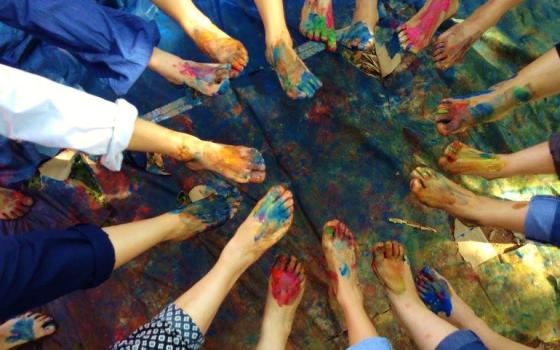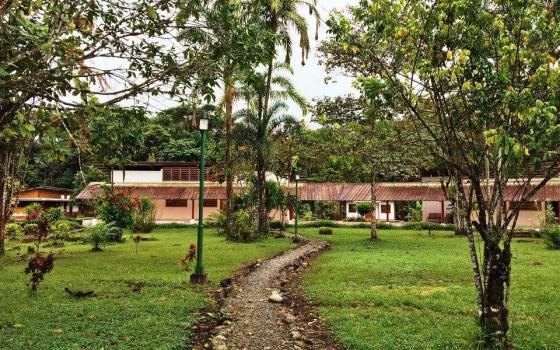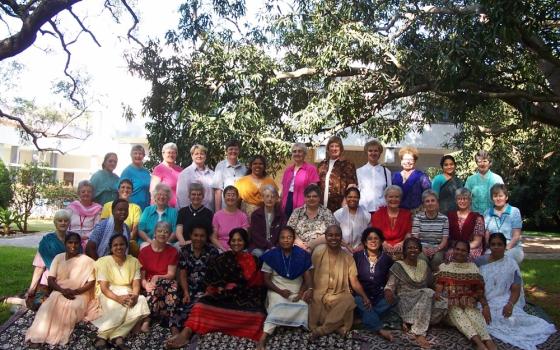New roles. Social analysis. Diversification. Growth and decline. Collaboration. Freedom. Widened horizons.
The panelists discuss the creative ways the ministries of their congregations are evolving and how they are moving to ministries of presence, empowerment and systemic change — yet in all their ministries, they see the persistence of their charism. They addressed this question:
Have you seen / do you see a shift in ministries in your congregation over the past 10 to 25 years?
______
 Winifred Ojo was born in western Nigeria and is a trained teacher and formator with experience in administration and retreat work. After many years in leadership, she now leads the Sisters of St. Louis and lives in Ireland, where her institute is based.
Winifred Ojo was born in western Nigeria and is a trained teacher and formator with experience in administration and retreat work. After many years in leadership, she now leads the Sisters of St. Louis and lives in Ireland, where her institute is based.
Since 1842, the vision of our founder, Louis Bautain — a world healed, unified and transformed by the saving wisdom of Christianity — imbued our ministries of education and health care. Interwoven with these were pastoral care and care for the poor and marginalized.
In the last decades of the 20th century, responding to the church's preferential option for the poor and as a result of its own social analyses, our institute diversified ministries to address structural injustices and work with the poor and marginalized. Our mission statement of that time is still very relevant for our ministries today with our increasing knowledge of the evolving story of the universe and massive global inequality.
In the last 10 to 25 years, there has been a marked shift in our ministries. We now have sisters involved in women's empowerment programs: rehabilitation of women who have been trafficked and/or incarcerated; skills acquisition; adult education and vocational education for self-reliance.
There are sisters in youth ministry, assisting disadvantaged youth and young adults to work toward certification, and in pastoral care such as chaplaincy work, choir and preparation for the sacraments.
Some work with migrants and displaced people, teaching them English and helping integrate them into the system as people with rights.
Others work in HIV/AIDS prevention and care and in care for the homeless, the physically and mentally challenged, the destitute and the elderly.
We promote spirituality of the care of the Earth and create awareness about trafficking.
Formation is also an important ministry. Our sisters work as spiritual or retreat directors, counselors, psychotherapists in ongoing formation or in formator training programs.
Integral to all of the above is the ministry of leadership and facilitation, which continues to grow and evolve in various ways as the demographics of the different areas of the institute change.
Finally, with the aging and retirement of our sisters in the Global North, most of those sisters are now involved in the ministry of prayer, presence, hospitality and passing on the patrimony of the institute through sharing their history with and empowering the younger generations and their lay associates to carry on the legacy. There is also mutual caring for one another in communities and visits to those in nursing homes.
For us Sisters of St. Louis, therefore, mission is throughout life, and everybody is in mission.
 Karan Varker is a Sister of Charity of Australia. She has been a teacher, principal and teacher-trainer in Papua New Guinea, America Samoa, Australia and the Solomon Islands. Her present ministry is nurturing the spirituality of teachers.
Karan Varker is a Sister of Charity of Australia. She has been a teacher, principal and teacher-trainer in Papua New Guinea, America Samoa, Australia and the Solomon Islands. Her present ministry is nurturing the spirituality of teachers.
The Sisters of Charity of Australia were the first institute of women religious to arrive in New Holland, or the "great southern land of the Holy Spirit," as Australia was called then. In 1838, five sisters sailed into Sydney from Ireland, having been sent by our foundress, Mary Aikenhead, at the request of Bishop John Bede Polding of Sydney.
Being an apostolic order, on arriving in this penal colony, these sisters immediately began ministering to the convict women and teaching in the little school adjacent to the women's prison. Our fourth vow of service of the poor gave them the freedom to visit the poor and sick in their homes and to open orphanages.
For over 160 years, our sisters established and staffed hospitals and schools in this country. In the mid-20th century, we extended our ministry to developing countries in the Pacific and Africa.
In the first decade of this 21st century, our institutions have grown, and the number of women religious has declined. To preserve these institutions for the ongoing service of the poor, after appropriate discernment, we sought the approval of Rome to have them declared a public juridic person with the title of Mary Aikenhead Ministries.
The leadership of our institutions, therefore, passed into the hands of qualified lay trustees, a major shift for our congregation. It freed us from the burden of running large institutions, and our sisters could continue to pursue ministries in education, nursing and social work. At the same time, we also relinquished the prestige that ownership of these institutions had given us.
Since our foundation, we have followed Ignatian spirituality, and today, we generally see ourselves as contemplatives in action with an emphasis on hospitality, advocacy, prayer, simplicity and justice.
Our sisters are finding new ways of practicing ministry: for example, the ministry of presence — present to God in all things and, where possible, being available, welcoming and friendly toward people whom we encounter daily. It means focused listening, sharing one's gifts and being bearers of God's good news.
We remain committed to promoting the rights of the poor wherever we see the need and being faithful to the motto of our congregation, "The love of Christ urges us on."
 Immaculata Chukwunyere is a member of the Congregation of the Handmaids of the Holy Child Jesus. She was a headmistress and teacher in Nigeria and Kenya before moving to the U.S. in 1999 and now teaches high school English.
Immaculata Chukwunyere is a member of the Congregation of the Handmaids of the Holy Child Jesus. She was a headmistress and teacher in Nigeria and Kenya before moving to the U.S. in 1999 and now teaches high school English.
Shifting ministry is characteristic of every living organization. The founding charism of my congregation, Handmaids of the Holy Child Jesus (HHCJ), of all-embracing charity rooted in the personal love of Christ and humanity, espouses its members to a creative leadership in service — a relentless dreaming of creative reality for humanity, especially the underprivileged and the marginalized.
This creative reality challenges each member to a critical responsiveness to changes in times and cultures in service to God's people. This experience has become more visible in recent times as our sisters adopt new roles and responsibilities emerging from their respective ministries. One of such expansions is the University of Port Harcourt campus ministry, an offshoot of our congregation's teaching apostolate.
Education of children, especially girls and women, is our legacy from our founder, Sr. Mary Charles Magdalen Walker, a renowned educator who single-handedly established and managed one of the finest schools in the whole of West Africa in the 1900s. Following the sociocultural needs of the era, our community has schools and other programs that attend to the spiritual, intellectual, social and emotional needs of children between the ages of 2 and 17 and of married women. However, not much attention has been given to youth ages 18 to 25 as a group. The need to fill this gap led Sr. Caroline Mbonu to a creative dreaming of a campus ministry within the university where she teaches.
University years present tensions from academic and social identities. They provide overwhelming challenges to young adults who leave family protection for a world of endless possibilities.
In Nigeria, universities have become grounds for cultism and various hedonistic actions that challenge the exercise of Christian piety among students. These problems necessitate the need for programs that would continue to strengthen and support youths' identity formation as well as grant them avenues for seeking meaning, wholeness and purpose within the university campuses.
Hence, Sister's vision becomes a current reality of our community's all-embracing mission. Though the ministry is in its early development, my community intends to expand this new ministry for the spiritual and emotional health care of youth.
 Giselle Gómez was born in Nicaragua and entered the Society of Saint Teresa of Jesus in San Antonio, Texas. She taught religion and psychology and served as school principal in Nicaragua. She was elected provincial of the province of Central America and Cuba and is now serving as general counselor in Rome.
Giselle Gómez was born in Nicaragua and entered the Society of Saint Teresa of Jesus in San Antonio, Texas. She taught religion and psychology and served as school principal in Nicaragua. She was elected provincial of the province of Central America and Cuba and is now serving as general counselor in Rome.
Our congregation, the Society of Saint Teresa of Jesus (Compañía de Santa Teresa de Jesús) was founded by St. Henry de Ossó. He gave us Teresa of Ávila as a model of life and prayer. She teaches us to live in a relationship of friendship with Jesus and to recognize his suffering and resurrected humanity in people, history and the cosmos. With Teresa, in a community of disciples, we allow ourselves to be moved by situations that affect the life and dignity of people and then become involved with them as educators.
Our specific manner of evangelizing is by being educators. We educate by promoting personal and community processes in keeping with the Teresian itinerary, or way of life, so that people will discover God's plan in their lives, develop their abilities, and be agents of social transformation.
We commit ourselves to the promotion of freedom, peace and justice in our different apostolic works. We offer our contribution as women in different areas of life and in the diversity of cultures. We support the dignity of women and assume the challenge of deepening into the spirituality of Teresian education from a gender perspective.
During the last four decades, we've widened our understanding of education, and we live our educational mission in a variety of ways in schools and in other educational and pastoral projects: spirituality; spiritual exercises; schools of prayer; base communities; social projects; Justice, Peace and Integrity of Creation; alternative medicine; migrants and displaced; networking and grassroots participation for the defense of women; human rights and biodiversity; and collaboration with the different conferences of religious, intercongregational communities and projects.
Widening our understanding of education has been a gift that continually mobilizes us to live with one ear to God and the other to people — from below and from within, in networks and community, with a loving and inclusive attitude, caring for justice, peace and the whole of creation.
 Joeyanna D'Souza is a member of the Congregation of the Daughters of St. Paul in India. She has worked with the Pauline Press in editing and has authored six books. Presently, she is marketing manager of Pauline Publications & Communications, India.
Joeyanna D'Souza is a member of the Congregation of the Daughters of St. Paul in India. She has worked with the Pauline Press in editing and has authored six books. Presently, she is marketing manager of Pauline Publications & Communications, India.
I will celebrate 25 years in my congregation in 2018: I joined the Daughters of St. Paul in India in 1993. We use the new means of communication for spreading of the Gospel. Canonically, we do the service of proclaiming the Good News.
The greatest change has been the introduction of the Internet to society sometime in the '90s and the hope it generated. It was a boost to the already-raised hopes that came with the invention of the computer and its use in our publishing apostolate.
The Linotype machine was suddenly not required, and those who had spent years on it realized how easy the computer made the work. More sisters were sent for computer studies and new printing technologies. Computers were being used in every sector of the apostolate: publishing, accounts, correspondence and more.
Email was something we marveled at. Sisters were checking their inboxes every day, creating email IDs and remembering passwords. The phrases "please remember your password" and "write it down somewhere" became common, and sisters discussed how to make complicated passwords that included numbers and special characters.
I had joined the convent with computer and programming knowledge, so I was often marveled at and became a teacher overnight without having to earn a teaching-skills diploma! It was such a joy.
With the onset of the Internet, the space for proclaiming the Gospel using the new media became wider, and we felt called and impelled to use this medium for the Gospel.
Books were not the only means of spreading the Gospel, but they seemed to remain the only constant, though their quality in paper, art and presentation improved tremendously. Other means of communication, like music and film, evolved rapidly. From LP records to cassettes to CDs to MP3s to downloadable music and podcasts, music was transferred and made available faster and with much better quality. Even films, which used to be the privilege of only those who could visit theatres, soon became a common thing with the invention of videotapes, DVDs, Blu-ray discs and YouTube.
Our congregation, founded by Blessed James Alberione, has in its constitution to use the most modern means of communication for the spread of the Gospel and has continued to use new means of diffusion of books and audiovisuals to people in all walks of society. Simple family visits, Sunday displays in parishes, visits to schools and institutions: Sisters kept finding new ways of reaching out to people.
Participation in book exhibitions and seminars, opening an online shop to sell our productions, and selling our books on existing online platforms like Amazon became new means of reaching out. Sisters began engaging children, youth and adults in media education. Social media became a platform for proclamation and a pulpit to talk about the goodness of God.
God has indeed done marvels! He qualifies what he chooses and turns dust to human beings! Praise God!
 Teresita Abraham is a Presentation Sister from India living in rural Zambia. She developed the Garden of Oneness, a sanctuary of peace and harmony where she lives and works.
Teresita Abraham is a Presentation Sister from India living in rural Zambia. She developed the Garden of Oneness, a sanctuary of peace and harmony where she lives and works.
Although school education was our primary ministry for over two centuries, our horizons widened as our charism evolved to respond to the signs of the time.
Our global ministries have shifted from simply providing immediate services to seeking the root causes of conditions. Decades ago, we did communitywide social analysis to study the reality of the people we serve. This was a wake-up call that elicited a shift to a systemic change approach in all our ministries. We call it the "two feet" approach of direct service and systemic change.
We learned it is much easier to be providers than advocates. But we began to insert our communities and ministries among the marginalized people we serve. We undertook training to address the root causes of problems and to radically transform systems and structures that perpetuate oppressive situations. It taught us a new way of facing reality.
Our schools in India took on the project "Each one teach one" to provide literacy for mothers and grandmothers. The traditional three R's [reading, writing and arithmetic/math] broadened into justice education, aided by a social worker in every school in India.
Education now included transformation through a variety of ways outside the regular school system and alternative learning systems like iScoil.
Health ministry expanded to include alternative healing methods native to local culture, as well as reflexology, healing touch and more sustainable ways to address the HIV/AIDS crisis.
Other initiatives included:
- Neighbourhood Parliaments of Children to promote their participation in issues of importance to them
- Justice, peace and integrity of creation programs and centers to facilitate Earth literacy.
- An invitation to every unit in the congregation to have a justice contact person
- Social financing to support people in poverty
- Ministry to migrants and refugees
- Active participation in our work as an accredited nongovernmental organization at the United Nations, with special focus on human rights, indigenous peoples and environmentally sustainable living
- A network of animators to promote the sustainable development goals
- Partnering in every country with organizations committed to social transformation and the integrity of creation, such as the network of justice and peace commissions in our places of ministry
In particular, we developed programs and projects to advocate care of Earth. Today, we see Earth literacy as central to our ministry of education. It is a new catechesis for today. Stay close to creation, and we stay close to the Creator.



